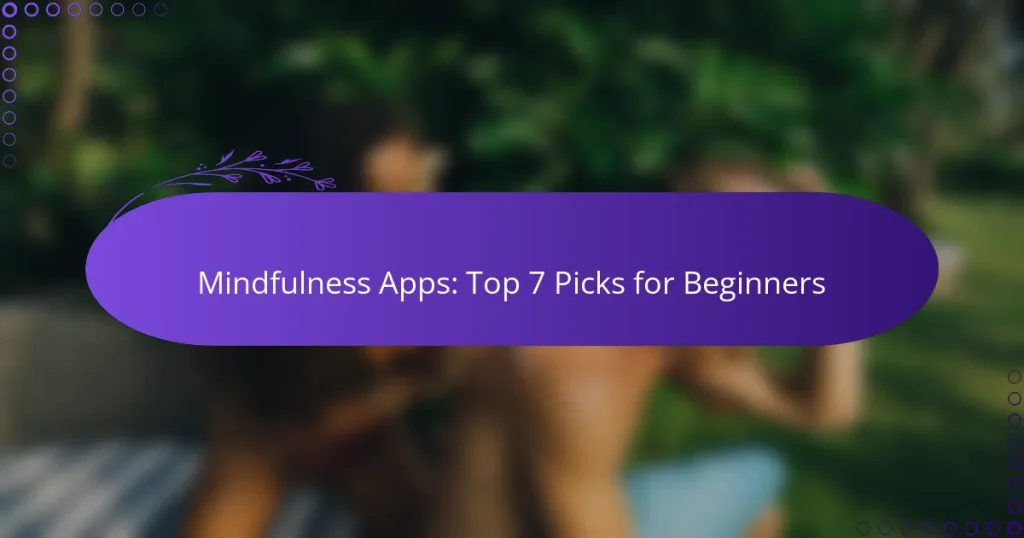For those new to mindfulness, selecting the right app can make all the difference in establishing a consistent practice. The best mindfulness apps for beginners feature user-friendly interfaces, guided sessions, and diverse techniques to enhance meditation and relaxation. With tools like meditation timers and progress tracking, these apps provide accessible support for cultivating awareness and reducing stress.
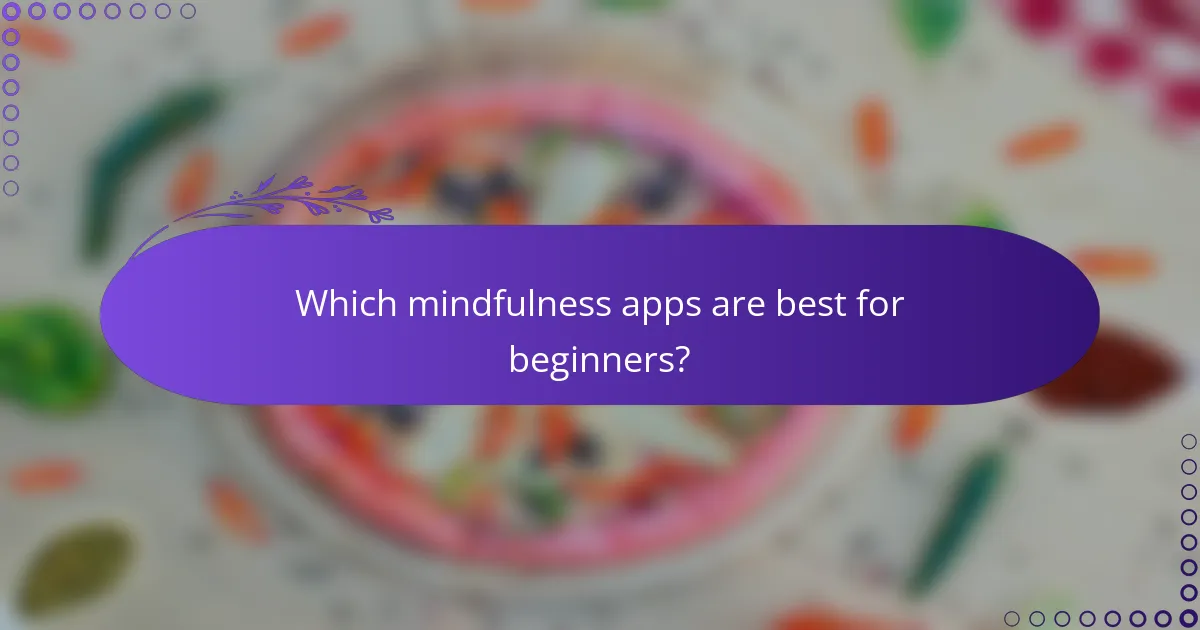
Which mindfulness apps are best for beginners?
For beginners, the best mindfulness apps offer user-friendly interfaces, guided sessions, and a variety of techniques to help users establish a consistent practice. These apps typically include features like meditation timers, progress tracking, and community support to enhance the experience.
Headspace
Headspace is designed to make meditation accessible and enjoyable for newcomers. It offers a structured approach with themed courses and bite-sized sessions, making it easy to fit mindfulness into a busy schedule.
The app includes animations that explain meditation concepts, which can be particularly helpful for those unfamiliar with the practice. Users can choose from various topics, such as stress relief, sleep improvement, and focus enhancement.
Calm
Calm is another excellent choice for beginners, featuring a wide range of guided meditations, sleep stories, and soothing music. The app’s interface is visually appealing and straightforward, allowing users to navigate easily.
Calm offers sessions that range from just a few minutes to longer practices, accommodating different schedules and preferences. Additionally, the app includes breathing exercises and mindfulness tools to help users manage anxiety and improve overall well-being.
Insight Timer
Insight Timer stands out for its extensive library of free guided meditations and talks from various teachers worldwide. This app is ideal for beginners who want to explore different styles and techniques without a financial commitment.
Users can customize their meditation experience by selecting timers, ambient sounds, and even joining community groups for support. The app also features courses that cover various topics, enhancing the learning experience.
Simple Habit
Simple Habit focuses on quick, five-minute meditations designed for busy individuals. This app is perfect for beginners looking to incorporate mindfulness into their daily routine without a significant time investment.
The app offers a variety of scenarios, such as preparing for a meeting or winding down after a long day, making it relatable and practical. Users can easily track their progress and set reminders to maintain consistency.
10% Happier
10% Happier is tailored for skeptics and those new to meditation, offering a straightforward approach to mindfulness. The app features practical lessons and guided meditations from experienced teachers who focus on real-life applications.
With a mix of video content and audio meditations, users can engage with the material in a way that suits their learning style. The app also includes a community feature, allowing users to connect and share experiences.
Smiling Mind
Smiling Mind is designed specifically for younger audiences, including children and adolescents, making it a great option for families. The app offers age-appropriate programs that teach mindfulness and emotional regulation skills.
With a focus on mental health and well-being, Smiling Mind provides guided meditations and activities that can be integrated into daily life. The app is free to use, making it accessible for all users.
MyLife
MyLife encourages users to check in with their feelings and offers personalized mindfulness practices based on their emotional state. This app is beneficial for beginners who want to develop self-awareness and emotional intelligence.
Users can select their current mood and receive tailored recommendations for meditation, breathing exercises, or journaling prompts. The app’s focus on emotional well-being makes it a valuable tool for those starting their mindfulness journey.
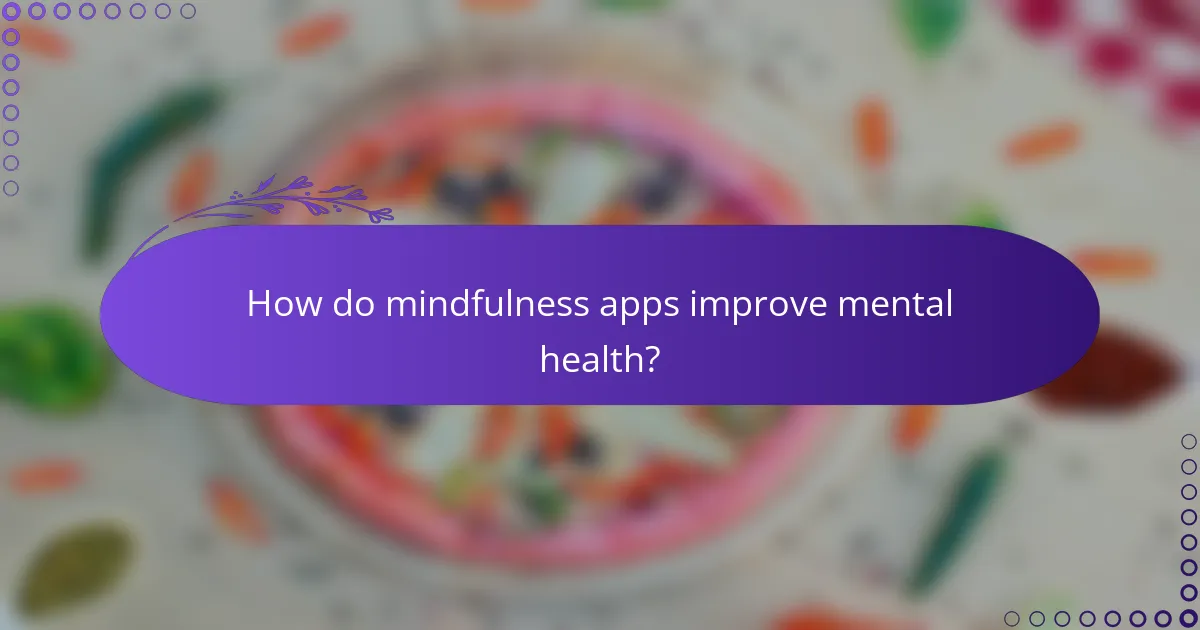
How do mindfulness apps improve mental health?
Mindfulness apps enhance mental health by providing accessible tools for meditation and relaxation techniques. These apps help users cultivate awareness and reduce stress, leading to overall emotional well-being.
Stress reduction
Mindfulness apps are effective for stress reduction by guiding users through meditation practices that promote relaxation. Techniques such as deep breathing and body scans help lower cortisol levels, which can alleviate feelings of anxiety.
Many apps offer specific programs designed for stress relief, often ranging from just a few minutes to longer sessions. Regular use can lead to a significant decrease in daily stress levels, making it easier to manage life’s challenges.
Improved focus
Using mindfulness apps can enhance focus by training the mind to concentrate on the present moment. This practice reduces distractions and improves attention span, which is beneficial for both work and personal tasks.
Apps often include exercises that encourage users to practice single-tasking and mindfulness during daily activities. For example, a simple five-minute focus session can help clear mental clutter and sharpen concentration.
Enhanced emotional regulation
Mindfulness apps support emotional regulation by teaching users to observe their thoughts and feelings without judgment. This awareness fosters a better understanding of emotional triggers and responses, leading to healthier coping strategies.
Many apps provide tools for tracking moods and reflecting on emotional patterns, which can be particularly helpful for those dealing with anxiety or depression. Engaging with these resources regularly can promote resilience and improve overall emotional health.
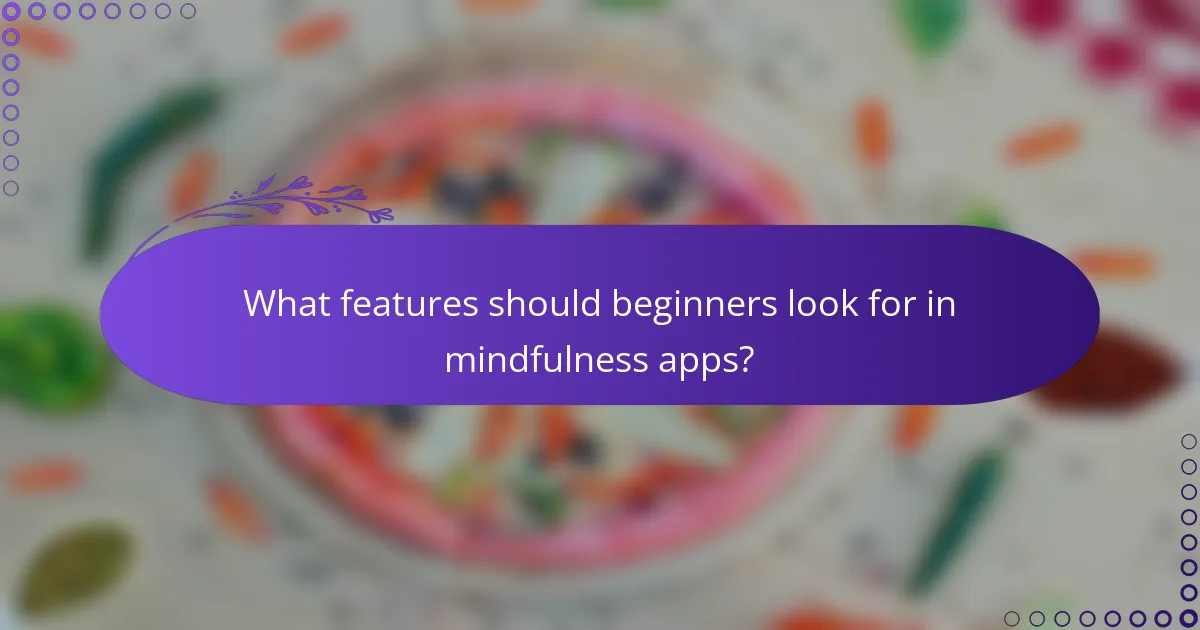
What features should beginners look for in mindfulness apps?
Beginners should seek mindfulness apps that offer a user-friendly interface, guided meditations, progress tracking, and a variety of content. These features help ensure a smooth and engaging experience while fostering a consistent meditation practice.
User-friendly interface
A user-friendly interface is crucial for beginners as it allows for easy navigation and reduces frustration. Look for apps with clear menus, intuitive layouts, and minimal distractions. Features like dark mode and customizable settings can enhance usability.
Consider apps that offer tutorials or onboarding processes to help new users get acquainted with the features. A straightforward design can significantly improve the likelihood of regular use and engagement.
Guided meditations
Guided meditations are essential for beginners as they provide direction and support during practice. Look for apps that offer a range of guided sessions, varying in length from a few minutes to over an hour, catering to different schedules and preferences.
Many apps include themes such as stress relief, sleep improvement, or focus enhancement, allowing users to choose meditations that align with their specific needs. This variety helps maintain interest and encourages users to explore different techniques.
Progress tracking
Progress tracking features can motivate beginners by visualizing their meditation journey. Apps that offer daily reminders, streaks, and achievement badges can encourage consistency and commitment to practice.
Look for options that allow users to set personal goals and track their meditation time over days, weeks, or months. This feedback can be instrumental in building a sustainable mindfulness habit.
Variety of content
A variety of content keeps the meditation experience fresh and engaging. Beginners should look for apps that offer different types of meditations, such as mindfulness, loving-kindness, and body scans, as well as supplementary resources like articles and podcasts.
Some apps also provide community features or forums where users can share experiences and tips, enhancing the overall learning experience. A rich content library can help users find what resonates with them and encourages ongoing exploration of mindfulness practices.
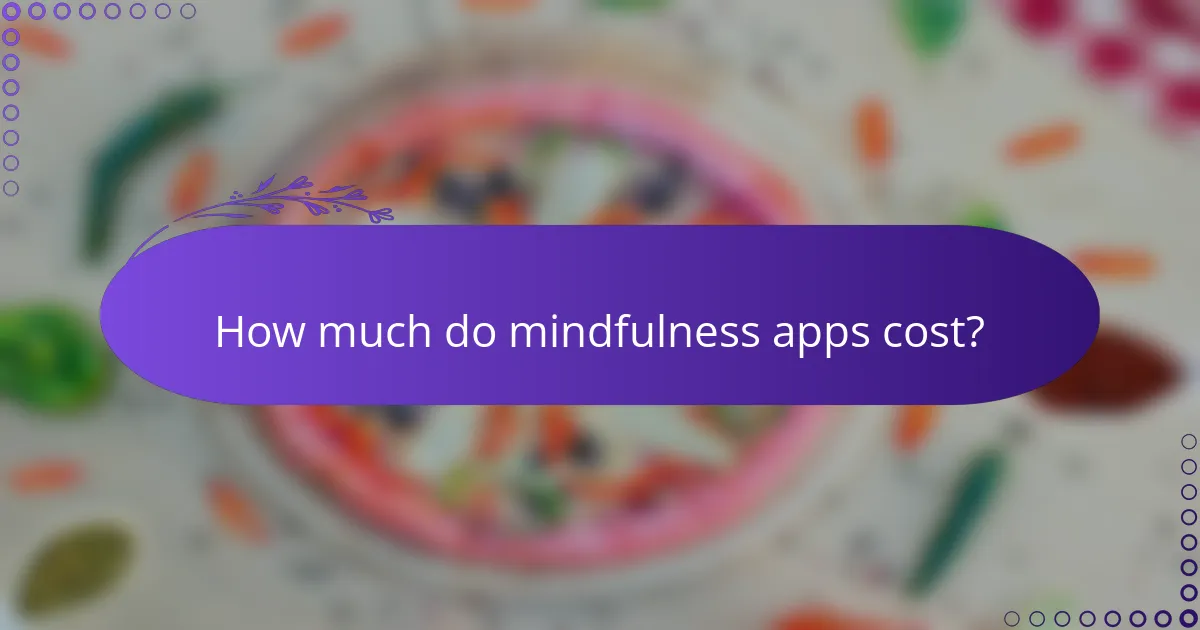
How much do mindfulness apps cost?
Mindfulness apps vary in cost, with options ranging from free to subscription-based models and one-time purchases. Understanding these pricing structures can help you choose an app that fits your budget and needs.
Free options available
Many mindfulness apps offer free versions that include basic features, making them accessible for beginners. These free options often provide guided meditations, breathing exercises, and daily reminders without any financial commitment.
Examples of popular free mindfulness apps include Insight Timer and Smiling Mind. While these apps may have limitations on content or features, they can still be effective for those new to mindfulness practices.
Subscription models
Subscription-based mindfulness apps typically charge a monthly or annual fee, granting access to a broader range of content and features. Prices can vary, often falling between $5 to $15 per month, with discounts for annual subscriptions.
Apps like Headspace and Calm offer extensive libraries of guided meditations, sleep aids, and mindfulness courses through their subscription models. Consider taking advantage of free trials to explore the content before committing to a subscription.
One-time purchase apps
Some mindfulness apps are available for a one-time purchase, allowing users to pay a single fee for lifetime access. These apps usually range from $2 to $30, depending on the features and content offered.
Apps like Simple Habit and Buddhify often fall into this category, providing a solid selection of guided meditations without ongoing costs. This option can be appealing for those who prefer not to manage subscriptions or recurring payments.
